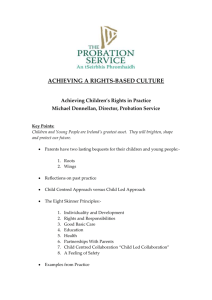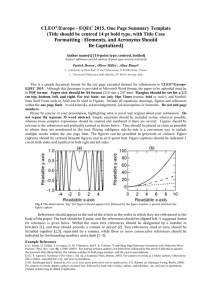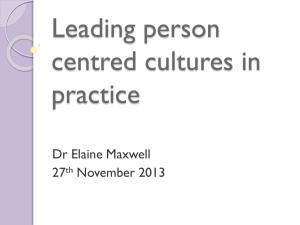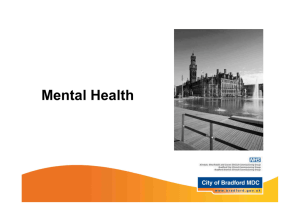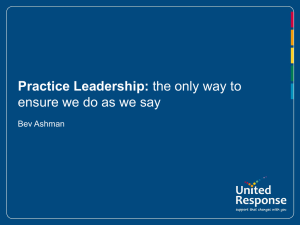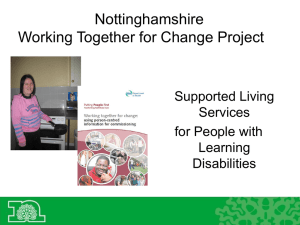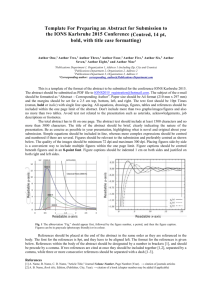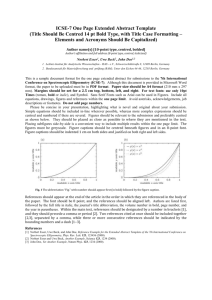Evaluation-of-Person-Centred-Reviews
advertisement
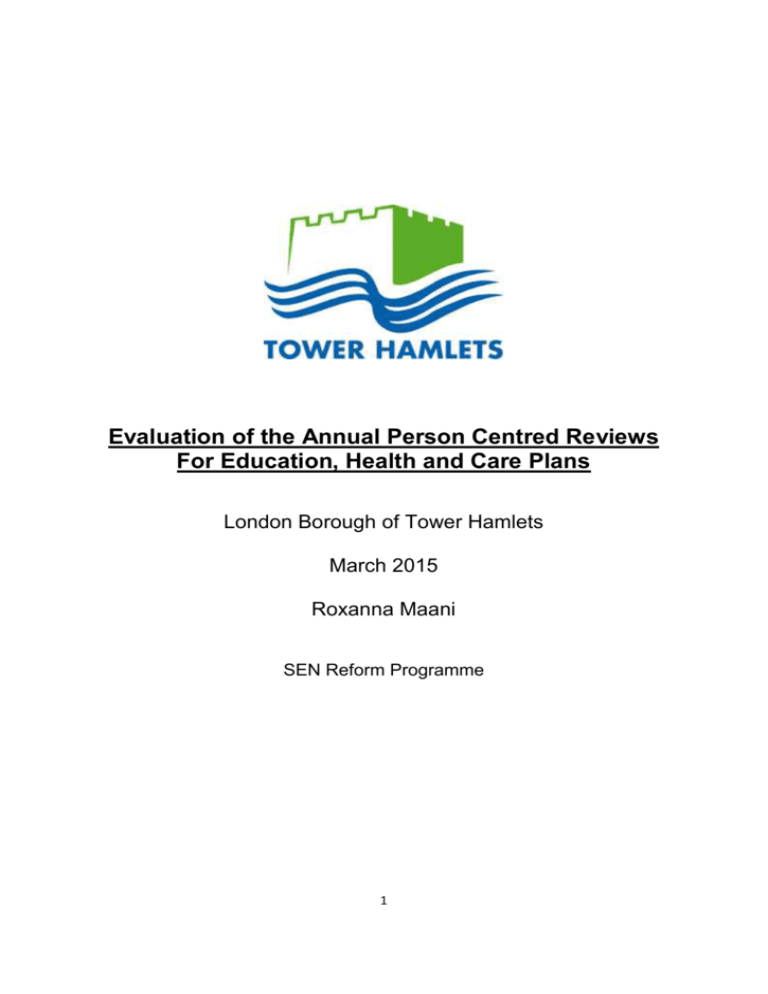
Evaluation of the Annual Person Centred Reviews For Education, Health and Care Plans London Borough of Tower Hamlets March 2015 Roxanna Maani SEN Reform Programme 1 Acknowledgements Firstly and foremost I would like to thank the children and young people who I interviewed and the schools for their support in making this possible. The parents and carers, who kindly gave up their time to be interviewed. David Carroll for considering this to be an important piece of research to be undertaken and all the ongoing support he has given throughout the research. Paul Mills for supporting me to identify children, parents and professionals for the evaluation. Marisa Tighe for creating the visuals and her expertise in ensuring the questions were suitable for children and young people with SEN. Andrew Sutcliffe for his advice and input into the evaluation. 2 Contents Sections Headings Background Page Number 4 What is a person centred review? 5 Introduction 6 Research Methodology 6 Summary of results from professionals 8 Analysis of professionals 9 Summary of results from parents and carers on person centred reviews 11 Summary of results from children and young people on person centred reviews 13 Examples of good participation in The Annual Person Centred Reviews 17 Summary of key findings 18 Conclusions 20 Appendix 1 – Questionnaire with visuals for children and young people 21 Appendix 2 – Questionnaire for Parents and Carers Appendix 3 – Questionnaire for 29 3 32 professionals Appendix 4 – Analysis of views of professionals 35 Background In March 2014 the Children and Families Act came into force with changes to special educational needs processes to be implemented from September 2014. The Code of Practice has been reissued several times. The latest version comes into force in April 2015. Education, Health and Care (EHC) plans are replacing statements of special educational needs and learning difficulty assessments (LDA). The new plan looks at the child’s and young person’s needs and brings together education, health and care services to achieve agreed outcomes. The focus is very much on what is important for children and young people and what they and their parents and carers want to achieve now and in the future. The new EHC plans are still first and foremost about Special Educational Needs (SEN). The plans put children, young people and families at the centre of the assessment and planning process. Person centred planning (PCP) is all about increasing choice and control. A personcentred way of working puts children, young people and families at the centre and advocates that everyone has the right to exercise choice and control in directing their lives and support. PCP is an approach expected to be adopted throughout not just as part of the statutory process that might lead to an EHC plan. Therefore Annual Reviews are only one of the forums we should expect to see a PCP in place. The SEND Code of Practice and the Children and Families Act 2014 also states that Local Authorities in carrying out their functions in relation to disabled children and young people and those with special educational needs, must have regard to: 4 The views, wishes and feelings of the child or young person, and the child’s parents. The importance of the child or young person, and the child’s parents, participating as fully as possible in decisions, and being provided with the information and support necessary to enable participation in those decisions. The need to support the child or young person, and the child’s parents, in order to facilitate the development of the child or young person and to help them achieve the best possible educational and other outcomes including preparing them for adulthood. What is a person centred review? A person-centred review (PCR) involves the child or young person which is facilitated by an adult within the school setting. It is essential that the child or young person is part of the process and participates as actively as possible. Participants are encouraged to give their views in a less formal way for example each member of the review will be asked what they like and admire about the child or young person. The personcentred way of working gives everyone the opportunity to acknowledge and celebrate what is working well and what their role and contribution to this is, as well as looking at what is difficult and not going well. This can then be addressed and results in jointly agreed actions. The Tower Hamlets model of person centred planning was developed through an extended pilot project with seventeen local schools. The pilot project ran from October 2010 to July 2014, so some of the schools were involved for 4 years. This model was adapted from Helen Sanderson Associates work for the government’s valuing people strategy for adults with learning disabilities. Training and feedback from all involved will ensure it continues to develop. To date extensive person centred planning training has taken place across all relevant staff in Tower Hamlets. Comprehensive leaflets have been produced for children, young people and professionals on person centred review meetings based on The Tower Hamlets Model. The SEN Reform team (in-borough) in the EPS consists of two Educational Psychologists (working 0.4 FTE between them) and three Specialist Teachers (1.2 FTE between them). The team delivered the following between September 2014 and January 2015: 5 An offer of support to all LBTH schools, including all nursery, primary, secondary, and special schools Individual visits and support carried out in 70 schools, including training, joint planning and modelling of chairing person centred reviews Keynote presentation and three workshops at the autumn SENCO conference One day multi agency training course in person centred planning, run three times SENCO interest group, three twilight sessions on various topics around the 2015 Code of Practice, Bespoke training for diverse professional groups, five sessions (Portage Service, Careers Service, Support for Learning Service, Tower Hamlets College, Integrated Service for Children with Disabilities) Introduction This report is an evaluation of the person centred approach used by schools in The London Borough of Tower Hamlets specifically for Annual Review conversion to Education, Health and Care plans. A Person Centred Approach facilitates children and young people with additional needs to make plans for now and the future, and to manage critical and crucial decision making times in their lives. It enables children and young people who may require support, to increase their personal self determination, independence and resilience. The aim of the research is to assess the effectiveness of person centred reviews for children, parents and professionals and how well we have done in terms of helping people understand and implement the process during implementation of their Education Health and Care Plan. The schools in Tower Hamlets have been supported to prepare for person centred reviews in order that pupil participation is meaningful. This report will highlight some of the good examples which have been created by staff and pupils in our schools. Research Methodology The methodology used for the research has been a combination of questionnaires for professional’s and one to one interviews with children, young people, parents and carers. 6 The Tower Hamlets schools that have provided feedback through a professional, parent, carer, young person and child have been widespread and across mainstream and specialist schools and not only those who were part of the original pilot. The questionnaires were emailed to all relevant professionals including SENCO’s, EPs, class teachers and other professionals including those who participated in the annual review. The questionnaires were also handed out to all the professionals who attended the SENCO conference in February 2015. All the children who participated in the one to one were interviewed at their schools and sixth forms they attend. A semi structured questionnaire with visuals was used as and when required. Some of the children and young people were also supported by their teaching assistant during the interview where it was deemed beneficial. Also some of the children were sent questionnaires to their school a week in advance of the interview in order to prepare them for the meeting in cases where it would be beneficial. Participants in this study included children and young people with speech and language difficulties, those with English as an additional language, and children with moderate, severe and multiple learning disabilities. A preliminary pilot would have been useful to identify and resolve potential issues with the methodology. For example statements to identify the training received by professionals and the impact this had on the Person Centred Review (PCR). However the limited timescale for this study made conducting a pilot challenging and not possible. However despite this the initial questions for children and young people were reworded to aid better understanding from the participants with a learning difficulty. Results of feedback from professionals A total of forty two responses were received from professionals including those who attended The SENCO conference in February. The professionals included speech and language therapists, class teachers, 7 SENCO, specialist teachers, educational psychologists, and assistant head of SEN. Results from professionals on Annual Person Centred Reviews Statement No The child knew what to expect in the meeting I was able to prepare something with the child I was able to prepare ideas for targets and interventions I was able to adapt my input to an appropriate level for the child It felt OK for the child to be at the annual review meeting The child was able to take part in the meeting at the appropriate level The child was listened to at the meeting I was listened to at the meeting The childs needs were addressed at the meeting The action plan and targets are expected to make a meaningful difference to the child A little 3 5 0 0 1 2 2 0 0 0 Mostly 6 1 3 1 4 1 1 0 0 1 Yes 11 6 11 8 6 8 6 8 6 6 The results have been overwhelmingly positive with 75% responding Yes to the statements of their experience of the person centred review 8 21 29 26 22 30 30 32 33 35 34 and only 3% stating No the statements. This percentage includes those who stated No to the statement “I was able to prepare something with the child” this was not required by all the professionals involved in the PCR. Analysis of views of professionals There were forty eight comments made on the returns from professionals. (Full details of the comments made can be found in Appendix 4) The positive comments These can be clustered into two major themes: EHC plan conversion process & person centred review meetings. The documentation developed for the conversion process was complemented as easier to enable a pupil’s voice to be heard. The feedback on the person centred review meetings can be looked at under the following headings: Sharing information Parental participation Participation at appropriate level Working together Student Participation Well Planned Training & Support LA support Each of the comments expressed how much they felt the person centred review had been a successful way of working with benefits for children young people and their families. The comments suggested that the review was a much more active experience for parents and their children and that both of them were able to express their views independently. This conclusion is supported by the views expressed by parents and children in the small sample of interviews that took place. Parents were given greater insight into how successfully their children are learning and taking part in learning opportunities in school. 9 Suggested improvements There were six comments made on how the experience could have been improved. These included making the EHC plan documentation more accessible, improving what they as a school can do having learnt from the experience of hosting a person centred review, having more active involvement from LA services and further training on Outcomes. Current challenges of some person centred reviews. The 22 comments made under this heading could be clustered into five themes: Parental Participation Participating at the appropriate level. Improved planning Contribution by all relevant professionals Training Each of these comments expressed the challenges experienced by some professionals. The highest was participating at the appropriate level. It is clear that for those professionals involved in the PCR meetings to carefully consider how they will most effectively communicate with the child or young person to enable them to express their views and opinions was key to a successful meeting. Other comments suggested meetings could have been improved with better planning, improved time management, sufficient preparation, parents having the appropriate support and the fact that everyone who needs to attend should be present at the meeting including representatives of health and social care. Results of feedback from parents and carers on person centred reviews A total of eight parents/carers took part in the consultation process. From this group 5 Parents agreed to be interviewed face to face using a semi structured questionnaire. Two parents completed the questionnaire and emailed to me and another parent provided feedback 10 over the phone. From the eight parents, two of the parents were interviewed in Bengali; a translator was not required for this as I am Bilingual. Statement – I knew we were having a meeting All parents answered yes to this statement. They were all made aware by the school a review would take place. One carer who does not speak English was called by a representative from the school who spoke Bengali to explain to her what the review would be about and when it would be, she was also sent a letter. Statement - I was able to prepare for the meeting 100% of parents/carers answered yes to this statement. They all felt they had sufficient time and information to prepare for the meeting. Statement - My child was able to prepare for the meeting 6 out of 8 parent/ carers, said yes or mostly to this statement. The other two parents felt there children were only able to prepare a little for the meeting. Statement – It felt okay for my child to be at the meeting 100% of parents and carers stated that it was OK for their child to be in the meeting. Statement- My child was able to take part in the meeting at the appropriate level 100% of parents and carers stated their child was able to participate at the appropriate level. Statement – My child was listened to at the meeting 100% of parents and carers stated their child was listened to Statement – I know what will happen after the meeting 100% of parents felt able to say they mostly or completely knew what will happen after the meeting. Statement- I think things will get better after the meeting 100% of parents think things will get better. 11 Summary of results from parent and carers on person centered reviews Statement I knew why we were having a meeting I was able to prepare for the meeting My child was able to prepare for the meeting It felt OK for my child to be at the meeting My child was able to take part in the meeting at an appropriate level My child was listened to at the meeting I was listened to at the meeting I know what will happen after the meeting I think things will get better after the meeting 12 Option 1 Option 2 Option 3 Option 4 No A Little Mostly 2 1 Yes 8 8 5 8 8 8 8 5 8 3 The following comments were made by parents and carers after attending their child’s review. “The school have done a great job, I cannot think of any other improvement needed. This is the second review my grandson has attended. We have seen a great improvement in his work and behaviour”. (Grandmother of 8 year old) “I am very happy with the way things are going. He now has speech which he did not have previously, his reading and writing has improved a lot. He was very involved in his review meeting, he put names on chairs before they came in, he showed his work. His friend came to the meeting with him. She was saying positive things about him. This has all made a difference.” (Parent of 7 year old) Feedback from children and young people As part of this evaluation ten children and young people were interviewed. Some of the children were provided with visual support as and when required. The remainder of the children did not require visual support and responded to questions without any additional support from another adult. The age range of children and young people was from 6 to 19 years old. The schools covered have been primary and secondary which include both specialist and mainstream schools. Summary of results from children and young people on person centred reviews Statement I knew there would be a meeting I knew why there would be a meeting I helped plan the meeting How did you feel? What was the meeting all about People toled me what they liked about me The adults listened to me I know what I am getting better at I know what I am finding difficult I know what will happen after my meeting I think things will get better Option 1 Yes Yes Yes Very happy You Yes All the time Yes Yes Yes Yes Total 9 8 8 6 10 10 9 9 5 5 8 Option 2 No No No happy other people No sometimes No No No No 13 Total 1 2 2 2 0 0 1 0 1 1 0 Option 3 OK something else never unsure unsure unsure unsure Total Option 4 Total 0 0 0 2 Sad 0 0 0 Tell me some more about that 1 4 4 2 An overwhelming 79% of children and young people provided a positive response this includes 90% knew there would be a meeting. 80% of knew why there would be a meeting. 80% helped plan the meeting of which 60% were very happy with the meeting. 100 % of children said the meeting was about them and they were all told what everyone liked about them during the meeting. 50% of children knew what they were finding difficult and what would happen after the meeting. All the children and young people interviewed overall had a very positive experience of the review process. The following quotes explain how they felt about their PCR meeting. 14 “My favourite part of the meeting was people saying what they liked about me.” (T - Age14) “When I did the presentation it was not that scary because my friends were there.” “I did the presentation at home by myself. They played a video of me playing the piano. I chose where everyone would sit. I chose the snacks. I stayed for part of the meeting.” (M - Age 12) “It was fun! I liked doing my presentation.” (R - Age 13) “I talked about going to Tower Hamlets College or Tower Projects.” (F - Age 19) What would make your meeting better? Children and young people made the following comments when asked this question. Only four of the children interviewed made a suggestion, the others were happy with the way it was and did not think any further improvement was required. “Subject teachers to come to the meeting if they are free and not teaching.” (R - Age 13) “Help before my meeting to stay calm and not be anxious.” (J -Age 17) “Maybe create a poster to show everyone.” (M Age 12) “I would like to talk about my book club.” (D age 8) Child-friendly strategies have ensured the young people could access the meeting at the appropriate level. The young people were generally positive about the process, although some felt daunted at the prospect of delivering a presentation. One child stated: “I was nervous about the presentation but it went very well!” Another child stated: “It was fun! I liked doing my presentation.” 15 During the interview it was evident that they were both clearly proud of their achievements. The data collected from the children and young people suggest they felt they were listened to in the PCR. The benefits of a PCR meeting for the child or young person have been increased self-awareness, motivation and self-confidence. It has also provided an increased understanding of targets and outcomes, increased knowledge of how adults are supporting them. From the perspective of the professional and parents, the person centred meetings improve the quality of adult support as the meeting allows them to get to know the child or young person better. The targets and outcomes are more meaningful and better understood, adults can reflect on the impact of their working relationships. The following describes the positive impact a person centred review has had on a child by his class teacher. “Since the meeting I have really noticed an improvement in D’s motivation and concentration. He is working hard at school and home, which he always has but is working with greater independence and an improved self esteem. It has also helped to open up discussion with him about his learning and helped to keep him focussed on his targets.” (Class teacher, February 2015) 16 Examples of good participation in the annual person centred reviews As part of this evaluation a number of examples have been collected to highlight effective methods of participation by children and young people in their annual review meetings. Children and young people have been encouraged and supported to create presentations, deliver the presentation in their review meeting, show photos, show their work from a workbook they have made, make a video or have a one page profile. Some children have had a combination of these forms of participation in their review meetings. These methods have all help the child or young people to articulate their views. Example 1 In this person centred review creating a video for everyone to see at the review was the main method of supporting the young person to articulate his views. “The child had made a video of him interviewing other children in the school. The TA was very good at ICT and had edited the video so that it was very impressive. The child also brought a friend to the meeting. He went to the shops that morning and brought his favourite juice with the TA. All his friends and all the adults who work with him recorded what they liked and admired about him and this was displayed at the meeting. A few weeks before the meeting he met with the SENCO to go through the meeting and made invitations to everyone who needed to come.” Example 2 A young person with moderate learning difficulties was supported in compiling a PowerPoint presentation, which they presented at the meeting. This illustrated the work that they have been doing at school, what they have been doing at home, what’s been going well for them but also what’s not going that well for them and what they would like to get better at doing. Example 3 This was a one page profile of a child who is 6 years old. The profile provides a structure for recording information which is important for the 17 child. One-page profiles are a simple and versatile tool that capture and summarise key information about the child. Information is structured under headings that enable everyone to understand what is important to the person and how best to support them. This profile included the best way to support the child and what is important to him. In this case it was created by an adult to ensure the child was considered and represented appropriately. Example 4 In this person centred review a combination of methods was used to reflect the whole picture of the young person who is12 years old. This included showing a video of her playing the piano which was a new skill she had achieved this year, a power point presentation which she produced at home and delivered in the review. She also chaired the meeting with little support from her SENCO. In this example the levels of participation was high as the young person was able to chair the meeting with little support. Example 5 The child with the support of his teaching assistant created a book with examples of his work. A video of his friends saying what they liked and admired about him was also produced to show everyone who attended the review meeting. Everyone in the meeting was handed paper to write on thing they liked about him. Everyone took turns to tell him this, he was very happy to hear all the positive comments about. His friend was there to support him throughout the meeting. Summary of key findings The following is a summary of the main findings from children, young people, parents, carers and professionals. Young people and children The impact of person centred reviews on children and young people has been increased participation and engagement. The PCR seemed to provide adequate opportunities for the children or young person to share information about themselves, 18 share their views on their progress, what they find supportive, and any concerns they had. Children and young people were more confident to say what is important to them now and in the future because of the preparation and support that had happened prior to their meeting. It could be assumed that following a PCR, children feel higher levels of social inclusion in the school community. They seemed happy to be sharing information about themselves in the PCR meeting. Parents and Carers Parents saw another aspect of their child they would not normally see at home. Parents felt reassured that the school was doing their upmost to support their child with their education. Parents felt positive about their child’s future. Parents consider themselves to be equal partners in the process Parents were amazed at what their child had achieved with the appropriate level of support in their review. Professionals An overwhelming number of professionals had a positive experience of PCR’s. From the perspective of the professional, the person centred meetings improve the quality of adult support as the meeting allows them to get to know the child or young person better. Implications for professionals running person centred reviews Some of the challenges that have arisen from person centred reviews to date are: The PCR process means professionals should identify numerous effective methods of engagement to enable the young person or child to participate at the appropriate level. Implementing sufficient support for parents and carers prior to the meeting to ensure they are fully participating in the process. 19 An increase in contribution and attendance from all relevant professionals including health and social care is required. This will improve support received by the child. All professionals involved should provide a positive contribution to the PCR. Currently majority of PCR’s are dominated by professionals from the education sector. SENCOs and class teachers, parents have requested more input from health and social care. Conclusions Feedback from person centred reviews has been overwhelmingly positive from all participants of the evaluation. Parents, young people and professionals felt they had contributed to the process as equal partners, feeling their voices were heard. The examples highlight good examples of single and multiple strategies which have been used to support children and young people to participate in their PCR meeting. To date schools which have participated in this research have demonstrated the positive impact person centred reviews have had on not only the child’s education and young people but parents and professionals alike. It is clear from the research that children and young people who have been well supported through the PCR process have gained and developed skills beyond the expectation of parents and teachers. Although this study includes a small sample, some rich insights have been gained into the experiences of children, young people, parents and professionals subject to PCP procedures. It is evident the training and support provided to professionals in Tower Hamlets has placed this approach firmly onto their agenda. Professionals have developed and demonstrated qualities required to shape an ethos and culture based upon person-centred, inclusive, practice in which the interests and needs of children and 20 young people pupils with SEN are at the heart of all that takes place. Any future research should endeavour to measure the long term impact of person centred reviews on children and young people. 21 Appendix 22 23 24 25 26 27 Appendix 2 Parent’s feedback from person-centred annual review 1. Date of feedback: 2. Parent’s ethnicity: 3. Parent’s home language: 4. Child’s SEN 5. Child’s School 28 Key 0 = No 1 = A little 2 = Mostly 3 = Yes Before the review Statement Scale Rating 0 1 2 3 I knew why we were having a meeting I was able to prepare for the meeting My child was able to prepare for the meeting At the Review Statement Scale Rating 0 1 2 3 It felt OK for my child to be at the annual review meeting My child was able to take part in the meeting at an appropriate level My child was listened to at the meeting I was listened to at the meeting After the review Statement Scale Rating 0 1 2 3 I know what will happen after the meeting I think things will get better after the meeting What could have made the meeting better? 29 Is there anything else you would like to tell us about the meeting? 30 Appendix 3 Teacher/professional feedback from person-centred annual review 1. Date of feedback: 2. Professional role: 3. Child’s age: 4. Child’s SEN: 5. Child’s School Tick as appropriate: I have attached a good example of a person centred review 31 Key 0 = No 1 = A little 2 = Mostly 3 = Yes Statement Scale Rating 0 1 2 3 The child knew what to expect in the meeting I was able to prepare something with the child to contribute to the meeting I was able to prepare ideas for targets and interventions I was able to adapt my input to an appropriate level for the child Statement Scale Rating 0 1 2 3 It felt OK for the child to be at the annual review meeting The child was able to take part in the meeting at an appropriate level The child was listened to at the meeting I was listened to at the meeting The child’s needs were addressed at the meeting Statement Scale Rating 0 1 2 3 The action plan and targets are expected to make a meaningful difference to the child What could have made the meeting better? 32 Is there anything else you would like to tell us about the meeting? Please provide a good example of person centered review or attach to questionnaire: 33 Appendix 4 Analysis of views of professionals The following positive comments were made by professionals when asked if there was anything else they would like to tell us about the meeting. Theme Format of EHC Plans Comments about the EHC plan conversion process “The new format and conversion is much more straightforward and enables the pupils to be listened to more and their needs to be taken on board.” Comments about the person centred review meetings Theme Person Centred Reviews “It was a great opportunity to share with the pupils family how much progress she had made and talk about what everyone wanted her to achieve by the next meeting.” (specialist teacher February 2015) Parents needs were addressed fully and it was Parental great that everyone including support staff, participation teacher, parents and child were invited to the review.” (Speech and language therapist February 2015) “I think it helped the parent understand their child’s point of view better.” “Parents and teaching staff at the school were Participation at surprised and impressed by the ability of this appropriate level child to attend and contribute appropriately. Parents were pleased to see film of their child which showed new aspects of him.” “Parents enjoyed watching the movie of their child in nursery. The special box made that contained the things that the child liked in nursery Sharing information 34 Working together Student Participation Well Planned was much appreciated by all professionals attending the review.” (SENCO February 2015) “The child valued being listened to. We really enjoyed the meeting because it was meaningful to the child. He still talks about it now.” “The student felt more important and enjoyed completing the questionnaire and doing the presentation.” “Generally very successful. Better participation from the student.” “Given the child’s emotional difficulties, the meeting enabled him to make a good first contribution and should work as a starting point for greater involvement at future meetings.” “It was great to have him for the first half of the meeting. He made a power point gave a presentation of his work, chose snacks, made badges etc. He stayed for some of the talk but got bored as some of the topic was beyond his cognitive level, so he left happily after 30 mins. Professionals and parents thought this was appropriate.” “It felt very supportive and professionals, parents were encouraging of the young person”. “He remembers what he shared. He understood why this meeting was needed and he felt we had given him the opportunity to share his work contribution and was really surprised by all the positive comments from other pupils teachers adults at the meeting.” “The child had worked well with me on preparing assemblies to deliver to all year group in the school and share information about her condition. We waited to showcase her abilities as well as tell them about her disabilities. She played the piano with a quintet accompanying her. We recorded it and played her video at the annual review.” “The preparation that went into this meeting made this meeting successful. The feedback from the social worker was that this was one of the most successful annual review meetings he 35 Training and Support Good example of participation LA Support has been to.” “I have used a very large proportion of my bespoke EP time to train staff (teaching staff to facilitate the capturing of pupil voice in preparation. We have received really positive feedback from parents, outside agencies (CAMHS, EP) about the reviews attended and I think the success is very much down to the training and support of our EP.” “What worked particularly well was having 2 of the child’s friend attending. They were able to say what they liked about him, what he does well and what has changed. The child was visibly surprised and impressed about what he heard and his mother was in tears.” “Use of video recordings and peer comments were really well received by parents and child.” “LA advisor attended.” What could have made the meeting better? The following feedback was provided by professionals when asked what could have made the PCR meeting better Theme Comments about the EHC plan Conversion process Language of EHC plan Simplifying questions from EHC form for parents. The parents understanding of what an EHCP is, despite a pre-meeting discussion with an interpreter. I could have done with more information from the LA. When do we and the parents get a copy of the new plan? Representative person writing the plan to attend. “The person from Tower Hamlets who will be writing the EHC Plan attending as happens in other boroughs (Hackney Newham and Southwark in my Raising Awareness Support from LA 36 Training experience) Myself having more expertise in coming up with outcomes.” “External professionals might have had training in writing outcomes beforehand.” “More support needed to writing outcomes.” Theme Comments about the challenges of person centred reviews Parental Participation “Parents to have an understanding of what ASD means for their child. We asked them to bring a family member or advocate but they chose not to.” (SENCO February 2015) “As the student is unable to communicate and join the meeting. I think there should be an opportunity to show video evidence of the progress the student has made.” “Very difficult to prepare child in meaningful way, severely autistic non verbal. Parent can find meetings stressful if child is attending and not able to fully focus.” “He started to get restless towards the end, maybe we should have given him the opportunity to leave.” “Child expressing a preference to not go with positive things on offer. One child said she didn’t want a friend with her, she didn’t want music or snacks.” “If child had felt confident to present their own views rather than me read them out. Perhaps if a friend had joined, perhaps IT video.” “Child found it difficult to participate and concentrate. Only attended for a short while.” “More supportive involvement from child’s peers.” “How well the child understood the purpose of the meeting was not wholly clear due to age and SEN. How could this be overcome?” “Access to a wider range of interventions” “More time for the meeting as one hour is not Participating at the appropriate level. Improved planning 37 enough to ensure parents are heard well-can feel rushed”. “Space and time for meeting, availability of relevant professionals and working parents”. “The space could have been bigger and more comfortable. “Limited space in the building means we could not do everything we wanted to do providing the best environment for the child.” “I would have liked to prepare parents better by going through the questions and preparing them with comments for the meeting.” “The child could have seen photographs of those attending ahead of the meeting.” Previous discussion with XXXX about outcomes may have been useful as this took up a fair bit of time in the meeting”. (Educational Psychologist March 2015) Contribution by all relevant professionals Training “It is difficult to get the speech and language therapist at Mile End to attend. We were allocated a therapist way after the EHCP review meeting”. “Involvement from other professionals (SLT, Social Worker).” “Positive and constructive contribution from senior staff who did not attend.” More work needed on outcomes. External professionals might have had training in writing outcomes beforehand.” 38
